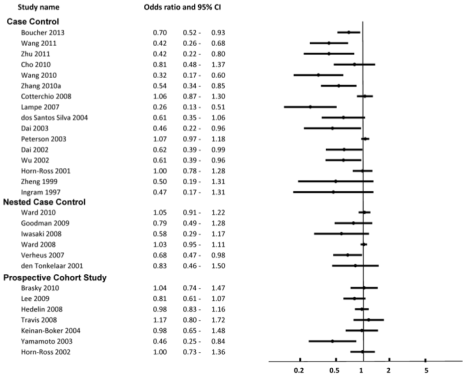Ditch the dairy and succumb to soy! 🙂 There is no consistent or convincing proof of it contributing to either breast cancer, prostate cancer, or thyroid problems. Just because it contains phytoestrogens (molecules that have a close resemblance to estrogen/estradiol and therefore can bind to estrogen receptors in the body) doesn’t mean it’s necessarily a bad thing. I made a graph that shows soy product sales in the US depicted together with the breast cancer rates for the same country to briefly illustrate the matter:

- 1. United Soybean Board. 2013. Consumer Attitudes About Nutrition: Insights into Nutrition, Health, and Soyfoods. 20th Annual Survey.
8. Howlader N., et al. 2013. SEER Cancer Statistics Review, 1975-2010, National Cancer Institute. Bethesda, MD, http://seer.cancer.gov/csr/1975_2010/, based on November 2012 SEER data submission.
What we know at the moment is that yes, these molecules do bind to these receptors. But does that mean that one’s risk of developing BC is increased? No. The few (environmental) risk factors for BC that have been established are: alcohol consumption, overweight/lack of exercise, and prolonged exposures to estrogen (which happens if you have your first child later in life, choose not to breastfeed, have your menopause later, choose to take estrogen pills to ameliorate the symptoms of menopause etc). So estrogen exposure is a risk factor. But if genistein (an isoflavone, which in turn is the name of subclasses of phytoestrogens) is already occupying the estrogen receptor, then does that increase or decrease your exposure?
Si, si, claro, indeed, it might actually reduce your risk of BC. Think of Asian women! Lowest cancer rates ever! Here’s a figure from a meta-analysis showing the results of soy consumption and BC risk:
What you see is that 1 study showed an increased risk, some showed no association, and most showed that soy is protective.
Now, there’s been some debate on the form of soy and following effects (as in fermented/non-fermented), and I can’t speak about that because I haven’t done the research yet. In addition, there are varying results when you look at consumption levels (confusing, because high consumption in the West likely counts as low consumption in Asia), duration of consumption (life time or shorter), consumption before/after menopause, and consumption during BC diagnosis and/or after BC recovery. That said, I don’t mean that there is any danger in any of those cases, but the protective effect may not be there/be even stronger.
Ayay I’m procrastinating, final neuro exam in two hours. Typical. Peace!
Source for the featured image (of genistein/estrogen molecular structures) seen before clicking this post:
Pavese, JM., Farmer, RL., and Bergan, RC. Inhibition of cancer cell invasion and metastasis by genistein. 2010. Cancer Metastasis Rev. 29:465-482


Pingback: Randomizing our ignorance. | envirodiet·
Pingback: Friends, we have to talk about milk. | envirodiet·